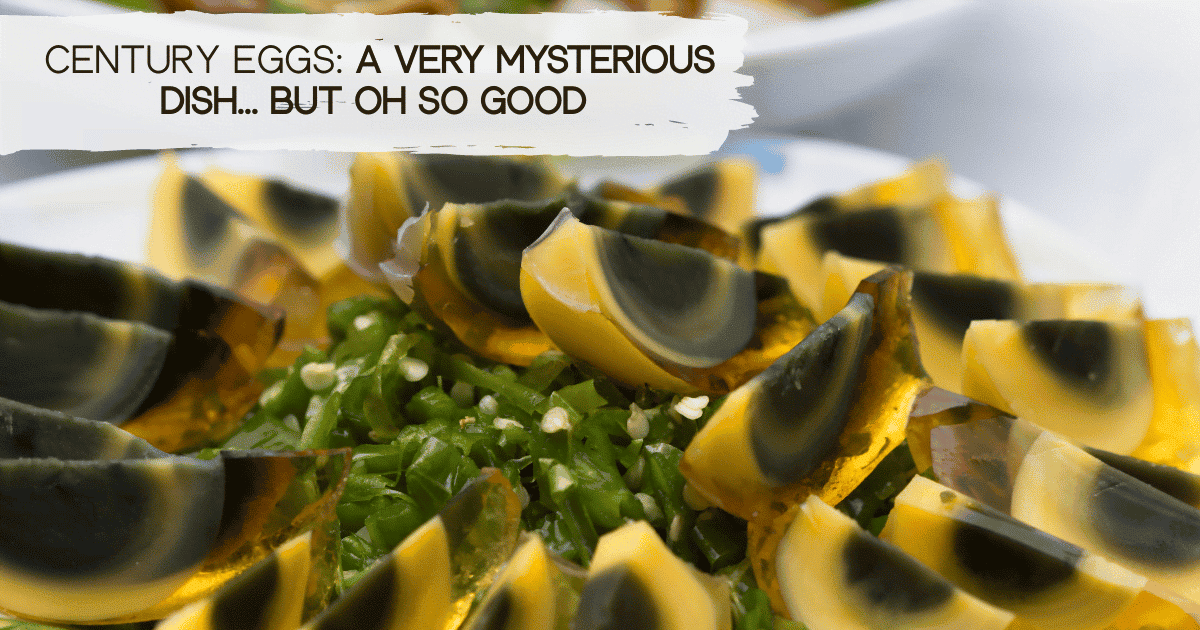One of the most unusual dishes in the world is called century eggs. This dish comes from China and is known as preserved eggs, millennium eggs, black eggs, skin eggs, and thousand-year eels.
Despite its unusual names, it’s not as uncommon a dish as you might think. It’s one of the oldest egg-based dishes in the world. Century eggs have several health benefits, and they are delicious as well! Keep reading to find out everything you need to know about this mysterious dish.
A Brief History of Century Eggs
There are lots of versions of the story about this mysterious dish. We will tell you the most famous version, which is hundreds of years old. The story is about a man who was constructing his home until he found a naturally preserved duck egg under slaked lime for a couple of months. He was curious about the taste, so he took a bite. The taste was surprisingly good; he had to add some salt to improve it. Today the flavor is known worldwide. Though the documents of the century egg’s discovery are unknown, scientists have concluded that it dates back to the Ming Dynasty, which was more than 500 years ago. The technique for producing large-scale century eggs today may differ from that in the origin story, but the egg preservation process has remained more or less the same.
What is the taste of century eggs?
If you dare to taste century eggs, you might find that they taste bitter! Their taste is similar to cheese, with a slight sulfur smell. In Asia, eggs are eaten throughout the day as the main course and as a side dish for breakfast, pastries, salads, and many other ways. Century eggs are primarily known to the elderly generation of post-70s and 80s, who had fewer snack options as children. However, they are expensive and contain ammonia that gives them their distinctive smell and taste that may be a bit off-putting, but it’s not harmful. Consuming century eggs are a great treat. Unlike ordinary eggs, these are a unique way to enjoy the unique taste of chicken. They benefit your health, but you should be careful not to ingest anything toxic, especially when trying to save money.
How to eat them?
The century egg’s unusual taste makes it a popular delicacy in Chinese cuisine. Century eggs are primarily used in salads, stir-fries, and rice or added to rice and noodles, but you can also eat them as a main dish. Do you want to know the best way to eat century eggs?
Slice the century egg in half lengthwise, then place the halves in a dish. Serve the plate with a sauce made of green chili pepper and vinegar, in a salad or with silken tofu. Occasionally, century eggs are ordinary with salted duck eggs and youtiao, dumplings. At dim sum restaurants, century egg are delicious with lean pork slivers. In Hong Kong, the waiters will serve you century eggs in mooncakes. You can even add some minced coriander to top it off. This dish is a great way to use up leftover century eggs. Make sure to keep it refrigerated after cooking. It will last for a long time if it is stored properly. Once you’ve boiled the century eggs, make sure to peel them. They’ll appreciate the nascent flavor if you’re serving them to guests.
Are century eggs healthy?
By now, you already know that eggs are a powerhouse of nutrition. But are century eggs also that healthy? Here are some facts that may convince you to taste them, at least.
Higher Nutritional Protein Than A Regular Egg
The Chinese view the century egg as a good protein snack because of how high in protein it is. Like carbs, protein is a nutrient vital for a person’s health and acts as the body’s fuel, as we are all aware. So eat an egg if you’re feeling lethargic. Who knows, perhaps that will work.
Contains fewer carbohydrates
There is good news for individuals trying to cut back on carbohydrates, though! Since the vitamin is diminished throughout the preserving process, century eggs are said to possess less nutrition than a regular egg. Because it has more protein, it makes up for the deficit because it also gives you energy when you eat it.
Excellent Iron Source
Iron is another essential component that the human body requires, and the century egg is surprisingly a great source of it! Iron is necessary for the growth and development of the body as well as for the cellular processes that take place within the body’s tissues.
Suitable Selenium Source
If you weren’t aware, selenium is a mineral that works as an antioxidant to shield the body from harm. Additionally, it supports healthy thyroid function and blood pressure regulation. Who would have imagined such a horrifying-looking delicacy as the century egg would provide these advantages?
Fantastic Source of Vitamin D
Eating the century egg is a fantastic source of D in addition to getting some from Mr. Sun. Our body needs vitamin D to improve the absorption of calcium, magnesium, phosphate, zinc, and iron through the intestinal wall. All of this is necessary for bone formation and protection, also known as normal bone mineralization.
Blood Pressure is Reduced
The century egg is thought to reduce blood pressure due to having all the crucial nutrients listed above. The risk of illnesses like stroke or heart attack, as well as heart and kidney failure, can be reduced by maintaining and raising healthy blood pressure.
Improves liver performance
As we are all aware, the liver serves as our body’s filter and processes blood as it travels throughout the whole body. It also performs other essential tasks, including making proteins that help blood clot and cleansing our bodies of dangerous pollutants.
Enhances Vision
It’s possible that this can replace laser eye surgery, which some of us cannot afford. Therefore, consuming century eggs in moderation over time and making an effort to practice eye exercises each day could well enable us to see without glasses in the future! Eating century eggs can benefit our vision since the nutrients they contain protect against dry eyes, cataracts, and other age-related eye disorders.
How to buy and store century eggs?
Chinese stores sell century eggs, which resemble little hay bales or excavated dinosaur eggs and are still covered in their fuzzy rice chaff coats. If you’re lucky, you might be able to locate them in the refrigerated department in the US stores. However, they often arrive in boxes containing each egg in a vacuum-sealed plastic bag. They are not to be confused with salted duck eggs, which have a shell color of grayish blue. I was astonished to see that you can even purchase them on Amazon! Wherever you decide to buy them, be sure that they are between 100 and 120 grams in weight and have smooth shells with no cracks.
Have you ever tried century eggs? Follow Gordon Ramsay’s instructions if you wish to surprise your loved ones with this mysterious dish.
Share your experience with preparing a century eggs in our Facebook group Chicken&Egg lovers.






